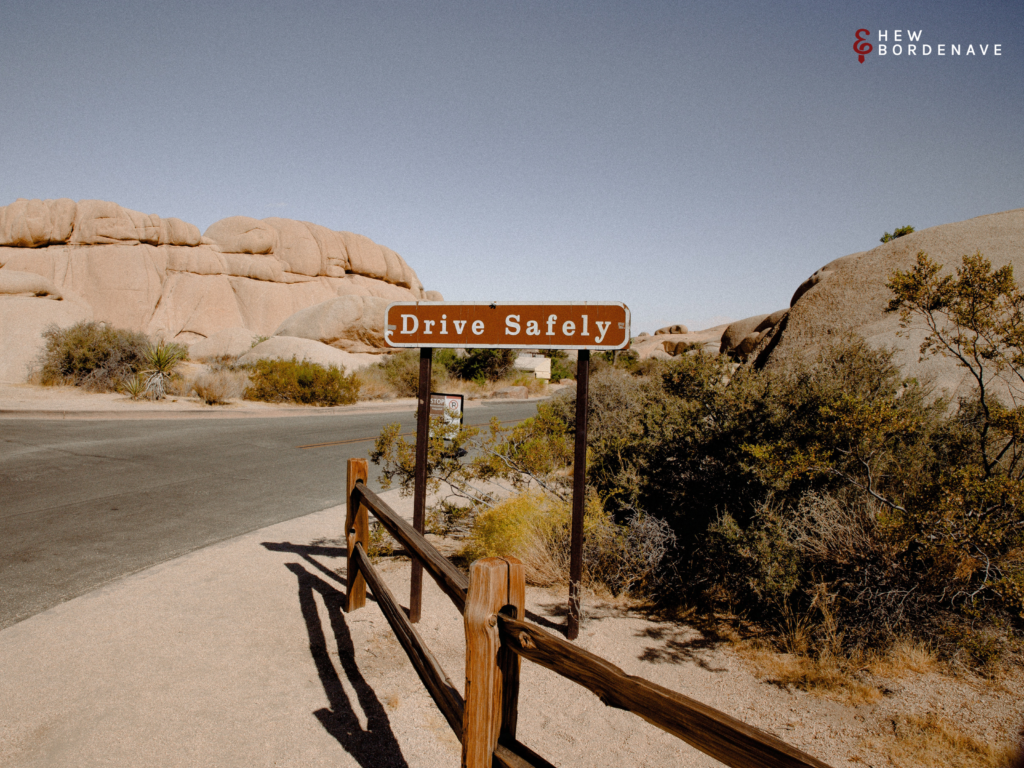Happy Lunar New Year!
As some of you know I do a post every year related to the Chinese zodiac animal of the New Year. Last year it was about landlord’s charging extra rent for dogs. The year prior to that one was, can you keep chickens in your backyard. Going to back when I started this tradition, in 2016, I wrote about can you own a monkey in Hawaii. Thank goodness dragon is still five years away! I have no idea what I am going to do that year …
2019 is Year of the Boar, so we are going hunting. Well, not literally, but I am going to cover the general basics for legally hunting feral pigs (sus scrofa scrofa) in the State of Hawaii.
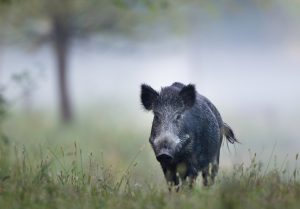
What do I Need to Hunt Legally?
Before getting to the paperwork, in general you should understand that hunting animals in Hawaii is largely regulated by the Department of Land and Natural Resources (DLNR). DLNR is responsible for the management of public lands and all the interests therein, including the animals. So if you are planning to hunt and have further questions, DLNR is likely who you will be contacting.
With regard to the paperwork, a hunting in Hawaii requires a hunting license. A hunting license is necessary whether you are going to be hunting on public or private lands. In order to purchase a hunting license though you must either possess:
- a Hawaii Hunter Education Wallet Card; OR
- a Letter of Exemption.
In case of 1., you’ve passed the Hawaii Hunter Education Class, then received a Hunter Certification Card. In the case of 2., that means you have received an out-of-state hunter education card or obtained a Hawaii Hunting License prior to July 1, 1990. Specifically, for non-residents you will need complete the non-resident Letter of Exemption Form and submit it as an application to DLNR. Obviously, once you submit your application the government will review, process, and ideally approve it. Like any government process, there will be additional procedures after approval. However, with approval you should be able to purchase a Hawaii hunting license. If you are a nonresident, then you will likely have to work with your local hunter education office to get certification or proof to be submitted to DLNR to obtain the Letter of Exemption.
Go Hunt, Hawaii, a DLNR website is the State’s official hunting resource and provides a schedule of classes to take basic Hunter Education as well as an easy to follow flowchart on the basics of hunting.
What if I am a Nonimmigrant Alien?
If you are coming to the United States and temporarily bringing firearms and ammunition into the United States, then the Federal Bureau of Alcohol, Tobacco, Firearms and Explosives (ATF) has a FAQ to address these issues. Obviously, this is just a general FAQ and any specific concerns may require more planning and communication with the agency or others involved, such as your travel arrangements.
What About Bringing Firearms and Ammunition Into Hawaii?
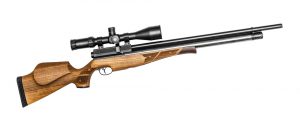
Firearms and ammunition brought into Hawaii must be registered within 48 hours after their arrival with the Chief of Police of the county of one’s residence, business or sojourn. So whatever islands you are heading to, you have to register your hunting weapons and ammunition. Understand that while DLNR regulates public lands, the regulation and enforcement of firearms happens at the county-level, so the police chiefs of the various counties have control. So you will want to contact the district police station on the island you are heading to or an office of the Division of Conservation and Resources Enforcement (DOCARE).
What About Minors and Firearms?
Minors, those who are 15 years and younger, that are hunting with a firearm must obtain a permit from the county police department.
What if I am Disabled Hunter?
Those with disabilities are suggested by DLNR to review the vehicle permit application and the cross-bow permit application. There may be additional requirements and issues. Therefore, it would probably be best to contact DLNR.
Where Can I Hunt Boar in Hawaii?
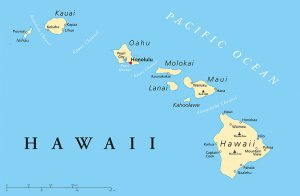
Ok, once you’ve squared away your hunting license where can you go to hunt boars? Well, in terms of public lands feral pigs may be hunted on Hawaii (also known as the “Big Island”), Maui, Molokai, Oahu, and Kauai. There are special zones for public lands hunting. It is best to check maps and understand the terrain. To be specific DLNR provides the Game Mammal Hunting Rules as a downloadable PDF. If you go through these Hawaii Administrative Rules you will see a number of maps, charts, and exhibits that discusses each of the islands zones, hunting units, means of hunting, bag limits, open hunting periods, open hunting days, and special conditions and restrictions. It is quite explicit. In addition, they provide many of these charts and tables for each of the islands as follows:
Yes, Lanai has a page as well, but this post is concentrated on feral pig hunting.
What about Private Lands?
In addition to everything indicated prior, that is having a valid hunting license, doing your hunting during limited hours, you obviously need the permission of the landowner. The exception as to what is okay to hunt with, that is setting weapons and method, hunting fees, and special prohibits are set by the landowner. More on those topics ahead.
Whoever Goes Hunting Are They Required to Have Special Clothing?
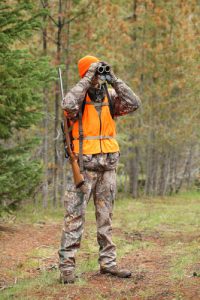
Yes, any person who goes on the hunt in a public hunting area basically needs to wear something specific. Think orange. That is whether the person is serving as a guide, accompanying or assisting the hunter, and the hunter themselves needs to be wearing an exterior blaze orange garment. The rules on this blaze orange garment are very specific, the point being safety. So the blaze orange garment while engaging in any of those hunting activities:
- may be a shirt, vest, coat or jacket;
- the material must be commercially manufactured and may be either solid or mesh with a maximum mesh size of one-eighth inch; and
- the use of camouflage orange is PROHIBITED.
Finally, these blaze orange garments are not required on designated archery only public hunting areas.
When Can I Hunt Boar? What Times During the Year and Day?
Game mammals (which includes feral pigs) may only be hunted from one-half hour prior to sunrise and until one-half hour after sunset. This is year-round. It is prohibited by law to hunt during one-half hour after sunset and one-half hour before sunrise. Basically, after the sun goes down and until rises again hunting is illegal. Again, much like the orange clothing requirement, safety is an issue.
How can I Hunt Boar? What Tools and Methods are Okay?
What about Using Flashlights?
So from the prior question and answer, you may be thinking what if we lit up the area? DLNR prohibits the use of any form of artificial light for hunting.
What about Dogs, Firearms, Bows and Crossbows or Melee weapons?
From DLNR’s Game Mammal Hunting page:
When hunting with dogs where permitted, hunters may use any muzzeloading rifle with a minimum of 0.45 caliber bore diameter; any rifle using at least a 0.22 caliber magnum load or center fire cartridge; shotguns loaded with slugs or 00 or larger buckshot or spears or knives. When hunting without dogs, hunters may use any rifle with a muzzle energy rating of 1,200 foot pounds or more; shotguns loaded with 00 or larger buckshot and muzzleloader rifles with a minimum of 0.45 caliber bore diameter (Breech loaders may not be used during muzzleloader only designated hunts). When hunting with a bow, the following drawing tension requirements are applicable: Long bows must have a minimum of 40 pounds at a 28-inch draw; Recurved bows must have a minimum of 35 pounds; Compound bows must have a minimum of 30 pounds.
Last Reminder: General Information and On Feral Pigs Only
Remember, we are only talking about feral pigs in this post, which falls under game mammals. Also much of this is general information provided on DLNR’s webpages, but when dealing with activities, such as hunting, then there are a lot of safety issues to deal with. Additionally, for this post everything discussed here is on feral pigs. While some of these rules and regulations apply to other animals, such as feral goat – there are slightly different permit requirements for other game mammals. For example, deer, wallabies, and wild cattle are protected. Further, game birds are regulated both on public and private lands. So again, you are going to have to do some homework for those animals. Many people get turned away at the license agent’s counter due to being unaware or requirements. Research and plan ahead!
Good luck and good hunting! May you find the Year of the Boar prosperous and full of bounty! As always, thanks for stopping by and reading.
-RKH
DISCLAIMER: This post provides general information, but does not constitute legal advice in any respect. No reader should act or refrain from acting based on information contained in the post without seeking the advice of an attorney in the relevant jurisdiction. Hew & Bordenave, LLLP expressly disclaims all liability in respect to any actions taken or not taken based on the contents of this post.




